
| Read from beginning |
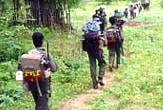 Our first day in the jungle. It's 0530 hours. The sentry has woken us. As per guerrilla rules, it is the last sentry's job to wake the camp.
Our first day in the jungle. It's 0530 hours. The sentry has woken us. As per guerrilla rules, it is the last sentry's job to wake the camp.
We wash our faces, roll up the plastic sheets and stuff whatever we have out into our bags, which takes us roughly 10 minutes, and are off. There's an hour's march to reach the outskirts of the village where Karan is scheduled to meet us.
I can see my outlaw companions clearly now. And am quite surprised at the sight. They do not at all match the image that I had in mind. These are young men, open, eager, without a trace of hostility on their face. True, they may fight, and fight to death, if threatened by the law, but I can't for the life of me see them as blood-thirsty men of violence, as fierce communists brandishing bloody sickles at any and every bourgeois -- a picture which I feel the media, especially the vernacular press, is guilty of creating by eagerly headlining every police press release that came their way.
There are five Naxals with us. Three are local guerrilla squad members while Ganesh and Vishwanath belong to a central guerrilla squad.
An area committee of the PW, known as the SAC or squad area committee, will have a CGS, which forms its backbone. The SAC secretary and its members are usually part of this main body. The LGSs -- there may be more than one in some areas -- of roughly seven members function under the CGS and may be responsible for anything up to 20 villages.
A CGS normally has 9 to 11 members, including its commander and deputy commander. The commander, in many cases, is the SAC secretary. All members of the CGS and LGS are armed -- with anything from .303 rifle, double-barrel gun, shotgun and self-loading rifle to AK-47. Besides, each squad is equipped with a couple of grenades and a Claymore mine (an explosive device which can be set off from afar).
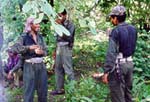 The squads have a dual role -- political as well as military. The former involves educating the villagers about Maoism, and the latter to fight the State. The guerrillas generally
move in the night. The days are spend on the outskirts of whichever village their work takes them to -- holding political meetings, organising and motivating the villagers to fight exploitation, educating them about health and welfare measures...
The squads have a dual role -- political as well as military. The former involves educating the villagers about Maoism, and the latter to fight the State. The guerrillas generally
move in the night. The days are spend on the outskirts of whichever village their work takes them to -- holding political meetings, organising and motivating the villagers to fight exploitation, educating them about health and welfare measures...
Over the years, the PW has succeeded in winning the trust of the tribals. In a sense, it is the villagers who are the guerrillas' protectors today. They give them food and shelter, and, on many occasions, provide vital information about police movements.
It is towards such a Naxal-friendly village we are moving now.
We make it to our second camp safely. The sun is not up yet, but it is hot, hot, and all of us are pouring sweat. The village is some 15 minutes away. Vishwanath sends two men to get water. The others are asked to fall in, and are given their orders for the day. Two of them start a fire and put the kettle on for tea...
We have finished breakfast -- of tea (with tinned milk and enough sugar to sweeten a wild boar's disposition) and biscuits. There's a slight change in the plan.
Prabhakar, another guerrilla who joined us an hour earlier, has brought news that Karan is sick. Chronic malaria. We would have to go and meet him. That's fine with us. Now we are waiting for lunch and the sun to go down a little bit before we start. I decide to get my notes up-to-date.
In the background I can hear H and G discussing plans for returning to Bombay. H is exploring the possibility of starting back on 27th evening, but G tells him that isn't possible. "The Martyr's Day celebrations start on July 28 and they would want us to cover it," he says, "I should think the earliest we would be able to reach Nagpur is on the 29th."
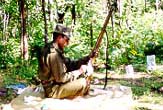 I move off to corner Vishwanath. He is sitting cross-legged on his blue plastic sheet, one hand on his .303 which rests by his side, gleaming clean. One thing that a guerrilla does religiously every day is clean his weapon. They generally do it right after the morning parade. As Karan later tells me, a guerrilla's best friend is his gun, and he's taught to take care of it like he would his child. It's always there, within reach, even while he's sleeping.
I move off to corner Vishwanath. He is sitting cross-legged on his blue plastic sheet, one hand on his .303 which rests by his side, gleaming clean. One thing that a guerrilla does religiously every day is clean his weapon. They generally do it right after the morning parade. As Karan later tells me, a guerrilla's best friend is his gun, and he's taught to take care of it like he would his child. It's always there, within reach, even while he's sleeping.
Vishwanath, this wiry, young revolutionary, who treks from village to village with his hand-stitched backpack, water bottle and Maoist messages, is from Ahiri, a village nearby. He is regarded as one of the best guerrillas in the area. He is literate, can even read a bit of English, and is deputy to one of the four woman commanders in DK, Radhaakka.
In the PW, it is considered very rude to address a woman without the suffix akka or didi, both meaning elder sister. "Only the landlords call their servants by name," I am to be told later.
I ask Vishwanath about ammunition. Is it rationed?
"Yes. Unlike the commandos (of the Maharashtra police), who come in with blazing guns, our ammunition is very limited," he tells me, "Not only that, we have to account for each bullet we fire."
A rifle-wielder like him, thus, would get 30 cartridges a month while the quota for an SLR is 60. The ration for the AK is 75 and that for a double-barrel gun 30.
Vishwanath is well aware of Marxism and Maoism. But not in the wide, world-encompassing sense. His world is small, his views matching it. His fight is for a classless society, yes -- but in a narrower sense of the word. He wants betterment. He wants escape from exploitation. He wants an end to the 'police repression' which he sees 'all around.'
"I know the risks involved in a Naxal's life," he says, "But the party is doing so much for us poor people that I don't mind laying my life for it."
Prabhakar, who's listening to our conversation, is a commander in his own right. Thirty-four years old, he joined the movement in 1991.
"I used to work on a farm before," he says, "The PW guerrillas used to come to our village. I saw that they were the friends of the poor, so I joined them."
I wander around the camp watching the other guerrillas. Except for the two on sentry duty -- one 'main' and the other 'support' -- the rest are relaxing. One is reading a Telugu book, one of the PW's own publications.
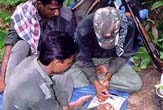 That's one thing that needs mention, this thirst for knowledge of the PW members. They are always peering into tattered books, the illiterate stumbling along the basics with guidance from the literate, and the latter striving to read more on what their fight is all about.
That's one thing that needs mention, this thirst for knowledge of the PW members. They are always peering into tattered books, the illiterate stumbling along the basics with guidance from the literate, and the latter striving to read more on what their fight is all about.
Vishwanath calls us over a little later. He and Prabhakar have been discussing something.
"What will you do if we get into a police ambush?" he asks.
R is of the opinion that nothing untoward would happen to us -- after all, we are journalists and have credentials to prove it.
"The point is they shoot first and ask questions later," G tells him, and the guerrillas nod in agreement. Turning to them, G says, "We would take cover behind one of the trees, I guess."
"Yes, that's right," Vishwanath agrees, "You should take cover and then retreat with Prabhakar. We will hold them off till you get out safely."
A few minutes later, the villagers arrive with food. There are five or six of them. Tribals, farmers, I would say, carrying big aluminium containers, their curious eyes sparkling at us from sun-blackened faces.
I am a bit surprised to see the rapport that exists between the Naxals and the villagers. Outside, the general impression is that the PW gets the villagers to co-operate at gunpoint. (For instance, I am to be asked by a colleague on my return why Naxals kill so many innocent villagers -- a doubt for which I don't blame her one bit.) But that is proved wrong in front of my eyes. It's difficult to believe the kind of comradeship that I see now arises from fear. There is no fear here, only trust.
In fact, one of the touching scenes of the trip is to happen a few hours later: As we walk towards Karan's camp, we stop just beyond an open field for a breather. A young cowherd -- he mustn't be more than 10 or 11 -- instead of fleeing from the dreaded Naxalwadis, comes eagerly to meet us. I can still see one of the guerrillas, with a paternal hand on the boy's head, inquiring kindly about his whereabouts.
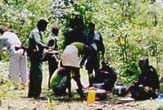 Now the villagers serve us lunch. Rice and hot dal. Cooked in the simple way of rural folks. As guests we get first preference, and are served in steel plates. There are no spoons; the servings are by hand. Two huge helpings are placed on my plate. I am so hungry that I gulp it down in no time.
Now the villagers serve us lunch. Rice and hot dal. Cooked in the simple way of rural folks. As guests we get first preference, and are served in steel plates. There are no spoons; the servings are by hand. Two huge helpings are placed on my plate. I am so hungry that I gulp it down in no time.
"Thoda aur lenge (Will you have a little more)?" a guerrilla moves towards me, threatening me with another severe helping. I back off hurriedly.
"Na, bahut khaya (No, I have eaten a lot)," I tell him, making him laugh.
"Arre, thodasa khaya aur yeh bol rahe ki bahut khaya (He ate a little and he is saying he has eaten a lot!)," he says.
I am no moderate eater, but my appetite is hardly a match for that of these outlaws -- their metabolism, just as it requires loads of sugar, calls for frightening intakes of rice too.
After lunch, we try to get some shut-eye. But it is difficult. I must mention about this terrible heat. It's not the killing dry heat of Delhi you have here, but an unbearable sticky hotness. High with humidity, it settles like a wet, hot blanket on you. Stifling, unmoving, making you sweat like mad. And in DK, your body doesn't stick to the civilised ways of sweating which a flimsy handkerchief or tissue can remedy. Here sweat pours. It oozes out of every part of your body, in amazing quantities, and it would be a very, very cool day if you were not wet all over after a 20-minutes trek. Life in DK definitely has its own flavour.
Before we start, Vishwanath again explains what we should do in case of trouble. He and two others would form the pilot team. We four, with two guerrillas between us in the line, would be the main body. And Prabhakar would bring up the rear.
"Stick close to them. They will take care of you," the Naxal tells us, pointing to the two men among us. "In case of trouble," he tells them, "you will meet us at ---village."